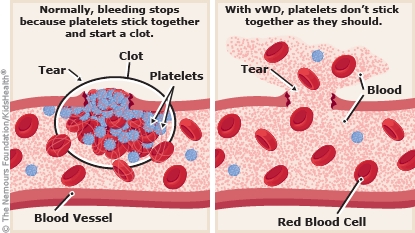Von Willebrand disease is a bleeding problem that runs in families. It happens when someone doesn't have enough of a protein called von Willebrand factor, or it doesn't work properly. Von Willebrand factor helps platelets stick together and form a clot to stop bleeding.
There are different types of von Willebrand disease (vWD). Some only cause a slight increase in bleeding, while others can increase bleeding a lot. Depending on what type your child has, your health care provider may recommend treatment with medicines to help the blood clot properly.

Follow your health care provider's advice for:
- Giving your child any medicine.
- Whether your child needs to go for any blood tests.
- Any medicines to avoid, such as nonsteroidal anti-inflammatory drugs (NSAIDs) like ibuprofen (Advil®, Motrin®, or a store brand), naproxen (Aleve®, Naprosyn®, or a store brand), and aspirin. All of these can increase bleeding.
- Whether your child needs to avoid certain activities that could lead to injuries and bleeding, such as contact sports.
- Following up with a hematologist (doctor who specializes in problems with the blood).
- When your child should follow up.
If your child is bleeding:
- For minor cuts, rinse the cut with water and apply pressure with sterile gauze, a bandage, or a clean cloth.
- If the cut is bleeding a lot, apply pressure with sterile gauze, a bandage, or a clean cloth. Raise the injured body part to slow bleeding, and call your health care provider.
- For nosebleeds, pinch the soft part of the nostrils together and have your child lean slightly forward to keep blood from going down the throat.
Other things to remember:
- Be sure your child's dentist and other health care providers know about your child's condition.
- If your child is going to have any dental or surgical procedures, be sure you check with your child's hematologist first.
- Females with von Willebrand disease can have heavy periods. If this becomes a problem, birth control pills or an IUD (intrauterine device) can sometimes decrease the bleeding.

You held pressure on a cut or nosebleed for 10–20 minutes and your child is still bleeding.

What are the different types of von Willebrand disease? The three main types are:
- Type 1, where there isn't enough von Willebrand factor (by far the most common type)
- Type 2, where the von Willebrand factor doesn't work as it should
- Type 3, where there is little to no von Willebrand factor
What are the symptoms of von Willebrand disease? Symptoms depend on what type of von Willebrand disease someone has. People with type 1 may just get nosebleeds more often than usual, bleed a little longer when they get cuts or have surgery, or have heavy periods. More severe bleeding can occur with both type 2 and type 3.
What causes von Willebrand disease? This is usually a genetic (inherited) disorder. The different types of the disorder are inherited differently. Talk to a genetic counselor to understand how your child's von Willebrand disease is inherited.




